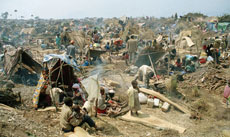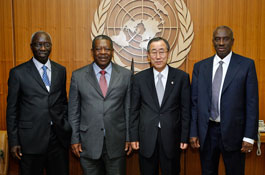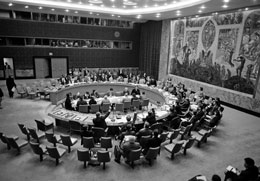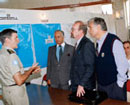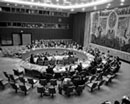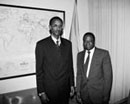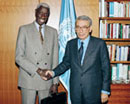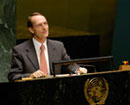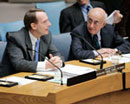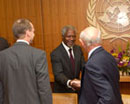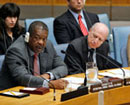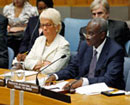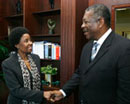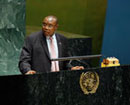|
Statute of the International Criminal Tribunal for Rwanda
Security Council resolution 955, 8 November 1994
By Michael P. Scharf*
Professor of Law, Case Western Reserve University School of Law, Cleveland, Ohio Formerly Attorney-Adviser for United Nations Affairs at the US Department of State Office of the Legal Adviser, Washington, D.C.
Introduction
The International Criminal Tribunal for Rwanda (ICTR) is the first international court of law established to prosecute high-ranking individuals for massive human rights violations in Africa. The purpose of this court is to prosecute those allegedly responsible for the 1994 Rwandan Genocide.
In an effort to punish those responsible for genocide, the United Nations established the International Criminal Tribunal for Rwanda. On 8 November 1994, the United Nations Security Council adopted resolution 955 (1994), which established “an international tribunal for the sole purpose of prosecuting persons responsible for genocide and other serious violations of international humanitarian law committed in the territory of Rwanda and Rwandan citizens responsible for genocide and other such violations committed in the territory of neighboring States, between 1 January 1994 and 31 December 1994.” As a Chapter VII Security Council resolution, the ICTR asserts primacy over the domestic laws and national courts of third States, and has the ability to force the surrender of an accused, be they a Rwandan citizen or not, located in Rwanda or any third State. As provided in Security Council resolution 977 (1995) of 22 February 1995, the ICTR is headquartered in Arusha, Tanzania, with additional offices located in Kigali, New York and The Hague.
There are four Chambers in which judges adjudicate trials and motions before the ICTR: three lower Trial Chambers and one Appeals Chamber. Although all three of the lower Trial Chambers are located in Arusha, the ICTR Appeals Chamber also adjudicates for the International Criminal Tribunal for the former Yugoslavia, and is located in The Hague, Netherlands. In total, the Chambers consist of 16 permanent judges and 9 ad litem judges, all chosen by the United Nations General Assembly. There are three permanent judges for each of the three Trial Chambers, and seven permanent judges for the Appeals Chamber; however, only five of these seven permanent judges sit on the Appeals Chamber at any given time. Although 9 ad litem judges serve on the ICTR, they are selected from a pool of 18 ad litem judges. The pool of 18 ad litem judges was created to expedite the judicial process on 14 August 2002 through Security Council resolution 1431 (2002). Originally, only four ad litem judges could serve on the ICTR at any given time, but due to the pressures of the judicial calendar and the Security Council’s desire to close down the Tribunal by 2009, the number of serving ad litem judges was increased to nine on 27 October 2003 through resolution 1512 (2003). The Office of the Prosecutor is responsible for investigating all crimes under which the ICTR has jurisdiction, prepares indictments, and prosecutes defendants. The Registry is responsible for providing all administrative support to the Chambers and the Prosecutor. On 9 January 1997, the ICTR held its first trial, one of the most momentous cases in international law: The Prosecutor v. Jean‑Paul Akayesu. During the 1994 Rwandan Genocide, Jean-Paul Akayesu served as the mayor of Taba, a city in which thousands of Tutsis were systematically raped, tortured and murdered. At the start of his trial, Akayesu faced 12 charges of genocide, crimes against humanity and violations of common article 3 of the 1949 Geneva Conventions in the form of murder, torture and cruel treatment. In June 1997, the Prosecutor added “three counts of crimes against humanity and violations of common article 3/Additional Protocol II for rape, inhumane acts and indecent assault” (Report of the ICTR (S/1997/868)). These additional counts marked the first time in the history of international law that rape was considered a component of genocide. On 2 September 1998, the ICTR found Akayesu guilty of nine counts of genocide, direct and public incitement to commit genocide and crimes against humanity for extermination, murder, torture, rape and other inhumane acts. The conviction of Akayesu marked “the first in which an international tribunal was called upon to interpret the definition of genocide as defined in the Convention for the Prevention and Punishment of the Crime of Genocide” (See ICTR Fact Sheet No. 1, The Tribunal at a Glance). According to the Convention, genocide is defined as “the act of committing certain crimes, including the killing of members of the group or causing serious physical or mental harm to members of the group with the intent to destroy, in whole or in part, a national, racial or religious group, as such” (Genocide Convention, article 2). As well as interpreting the definition of genocide, the ICTR also indicated that the crime of rape was “a physical invasion of a sexual nature, committed on a person under circumstances which are coercive” (The Prosecutor v. Jean Paul Akayesu, para. 598) and underscored that sexual assault constitutes “genocide in the same way as any other act as long as [it was] committed with the specific intent to destroy, in whole or in part, a particular group, targeted as such” (ibid., para. 731). Akayesu is currently serving life imprisonment in Mali. In addition to the important jurisprudence generated from the Akayesu trial, the ICTR also set two major precedents in the trial against Jean Kambanda (The Prosecutor v. Jean Kambanda). Kambanda served as Prime Minister of the Interim Government of Rwanda throughout the entire 100 days of genocide. Kambanda was brought before the ICTR in October 1997 and pleaded guilty to six counts of genocide, conspiracy to commit genocide, direct and public incitement to commit genocide, complicity in genocide, and crimes against humanity. Kambanda’s guilty plea and subsequent conviction marked not only the first time in international law that a Head of Government was convicted of genocide, but also that an accused person acknowledged his guilt for genocide before an international criminal tribunal. Like Akayesu, Kambanda is currently serving life imprisonment in Mali. Also noteworthy were the ICTR prosecutions of Ferdinand Nahimana and Jean-Bosco Barayagwiza, leaders of Radio Television Libre Milles Collines (RTLM), and of Hassan Ngeze, the founder and director of Kangura newspaper. The ICTR consolidated the indictments of these three men into a single trial, which is more commonly referred to as “The Media Case” (The Prosecutor v. Ferdinand Nahimana, Jean-Bosco Barayagwiza and Hassan Ngeze). This trial was the first time since Nuremberg that the role of the media was examined as a component of international criminal law. In 2003, Nahimana, Barayagwiza and Ngeze were convicted on counts of genocide, conspiracy to commit genocide, direct and public incitement to commit genocide, and crimes against humanity. Originally, Nahimana and Ngeze were sentenced to life imprisonment and Barayagwiza was sentenced to 35 years. Upon appeal, Nahimana’s and Ngeze’s sentences were respectively dropped to 30 and 35 years. According to Prosecutor Hassan B. Jallow, it is expected that between 1997 and the end of 2008, roughly 86 people will have been tried before the ICTR (Statement by Mr. Hassan B. Jallow, Prosecutor of the ICTR, to the United Nations Security Council, 4 June 2008 (S/PV.5904)). On 28 August 2003, the Security Council adopted resolution 1503 (2003), ordering the ICTR to “take all possible measure to complete investigations by the end of 2004, to complete all trial activities at first instance by the end of 2008, and to complete all work in 2010”. Since the issuance of resolution 1503 (2003), the ICTR has been involved in an active Completion Strategy campaign to comply with this mandate. In 2002 and 2003, the Security Council increased the number of judges serving on the ICTR, via resolutions 1431 (2002) and 1512 (2003), in order to expedite cases before the Tribunal. In addition to speeding up the trials, the Office of the Prosecutor has tried, where possible, to transfer cases to competent national jurisdictions, particularly in Rwanda. Since November 2007, the Office of the Prosecutor has been training the Rwandan judicial sector “in such areas as international criminal law and practice, prosecution strategies, law on indictments, advocacy, court-related information management and online legal research” so that it may be better able to handle any and all transferred cases from the ICTR (Report on the Completion Strategy (S/2008/322), para. 60). Currently five case referrals to Rwandan national courts, including the case of one fugitive, are awaiting judicial determination (ibid., para. 50). Despite these efforts, however, the ICTR faces many challenges in executing its Completion Strategy. According to Prosecutor Jallow in a June 2008 statement before the Security Council, “it is now evident that there will still be pending trial activity at the ICTR by the end of 2008… [and] …the need for a proper completion would be best sustained by permitting the ICTR to continue with trial activity beyond the end of 2008 in order to conclude pending cases” (Statement by Mr. Hassan B. Jallow, Prosecutor of the ICTR, to the Security Council on 4 June 2008 (S/PV.5904), p. 9) In 2008, three high-level fugitives, Callixte Nsabonimana, Dominque Ntawukuriryayo and Augustin Ngirabatware, were arrested. Due to their leadership roles in the Rwandan Genocide, none of these men can be transferred to national jurisdictions. Although the Office of the Prosecutor has been preparing for these trials, it is highly unlikely that all three cases will be adjudicated by the end of 2008. In addition to the recent increase in workload due to fugitive apprehensions, the ICTR is also threatened with an increased workload due to the inability and unwillingness of national jurisdictions to accept ICTR case referrals. Despite talking to several African countries about the possibility of transferring cases, the Office of the Prosecutor has managed to secure an agreement with only one African State, Rwanda, to accept case referrals (Report on the Completion Strategy (S/2008/322), para. 48). Furthermore, merely because Rwanda agrees, in theory, to accept ICTR referrals, does not mean that it will try any cases. Recently, the Trial Chambers rejected the Prosecutor’s request to transfer the case of Yusuf Munyakazi to Rwanda, a ruling that the Prosecutor is appealing (The Prosecutor v. Yussuf Munyakazi). In total, five cases can potentially be transferred to Rwanda. However, if none of these five cases are brought under Rwandan jurisdiction, the ICTR would be faced with additional work in 2009, “given that so far no country other than Rwanda has indicated a desire to receive any of these cases” (Statement by Mr. Hassan B. Jallow, Prosecutor of the ICTR, to the Security Council on 4 June 2008 (S/PV.5904), p. 10). Outside of Africa, only three States have agreed to accept ICTR transfers. To date, only two cases have been successfully transferred, and both were sent to France. Recently, the Netherlands revoked its offer to try ICTR defendant Michel Bagaragaza, thus increasing the ICTR’s judicial calendar and further straining its Completion Strategy. Finally, the ICTR is experiencing difficulty executing its Completion Strategy due to the existence of 13 indicted fugitives and the unwillingness of third party States to help apprehend these men. Since the ICTR can not try any of the 13 fugitives in absentia, it is imperative that they be caught as soon as possible in order for the ICTR to comply with the timeline set forth by the United Nations Security Council. However, several countries, particularly Kenya and the Democratic Republic of the Congo, have, according to Prosecutor Jallow, done little to catch fugitives known to be within their territory and must “intensify cooperation with and render all necessary assistance to the ICTR in connection with efforts to bring” all indictees to the ICTR (Statement by Mr. Hassan B. Jallow, Prosecutor of the ICTR, to the Security Council on 4 June 2008 (S/PV.5904), p. 10). Of the 13 fugitives, 4 are earmarked for trial at the ICTR and 9 face the possibility of a trial under national jurisdictions, should their cases be accepted for referral. Nevertheless, the ICTR is expecting a substantial increase in the number of cases to be adjudicated, well beyond the current timeline, should any of these fugitives be caught. Although the ICTR has already begun to downsize its activities and staff in compliance with the Completion Strategy, ICTR President Dennis Byron requested in the latest ICTR Completion Strategy report to the Security Council that “in light of the new developments due to exceptional circumstances…the Security Council and Member States…consider an extension of the judges’ mandates [which are due to expire by the end of 2008] so that they may complete the cases at trial… [and] that the Tribunal be provided with adequate resources to respond to the new additional workload [because] the Tribunal’s ability to maintain or improve upon its current level of efficiency is largely dependent on the retention of its highly experienced and qualified judges and staff” (Report on the Completion Strategy (S/2008/322), para. 68). This Introductory Note was written in May 2012. __________________________* The author expresses appreciation to Melissa Yasinow for her research and drafting assistance. Related Materials
A. Legal Instruments
Convention on the Prevention and Punishment of the Crime of Genocide, New York, 9 December 1948, United Nations, Treaty Series, vol. 78, p. 277.
Following the consideration by the Security Council of an item entitled “The situation in Rwanda”, on 30 April 1994, the President of the Council issued a statement in which he, on behalf of the Council, condemned all breaches of international humanitarian law in Rwanda, and recalled that persons who instigate or participate in such acts are individually responsible (S/PRST/1994/21). By resolution 918 (1994) of 17 May 1994, the Security Council determined that the situation in Rwanda constituted a threat to international peace and security and, inter alia, requested the Secretary-General to report on the situation, including on the humanitarian situation, in Rwanda, within five weeks. The Secretary-General submitted his report to the Council on 31 May 1994 (S/1994/640), in which he observed that massacres and killings continued in a systematic manner throughout Rwanda and that only a proper investigation could determine the facts in order to enable the determination of responsibility. Having considered the report, the Security Council, in resolution 935 (1994) of 1 July of the same year, requested the Secretary-General to establish as a matter of urgency an impartial Commission of Experts to collate information obtained from States and through its own investigations or the efforts of other persons or bodies, and to provide the Secretary-General with its conclusions on the evidence of grave violations of international humanitarian law, including the evidence of possible acts of genocide, in the territory of Rwanda. States and international humanitarian organizations were called upon to collate and make available substantiated information in their possession relating to grave violations of international humanitarian law. In a report submitted on 26 July 1994 (S/1994/879), the Secretary-General informed the Security Council of the establishment of the Commission and its mandate. Considering the parallel initiative taken by the Commission on Human Rights, which in resolution S-3/1 of 25 May 1994 had appointed a Special Rapporteur for Rwanda, the Secretary-General established the Commission of Experts with view to avoid unnecessary overlapping and to ensure maximum cooperation between the two bodies. In a letter dated 29 July of the same year (S/1994/906), the Secretary-General informed the Security Council of the appointment of the three members of the Commission. The Commission of Experts began its work on 15 August 1994 in Geneva. On 19 August, it held consultations with the Special Rapporteur of the Commission on Human Rights. From 29 August to 17 September 1994, the Commission of Experts conducted a field mission to Rwanda and its three neighbouring countries Burundi, Tanzania and Zaire. By a letter dated 1 October 1994, the Secretary-General forwarded to the Security Council the interim report of the Commission (S/1994/1125), which recommended that the Council amend the Statute of the International Criminal Tribunal for the former Yugoslavia as to include within its jurisdiction the crimes under international humanitarian law committed during the armed conflict in Rwanda. On 8 November 1994, the Security Council considered the interim report of the Commission of Experts, as well as the reports of the Special Rapporteur for Rwanda of the Commission on Human Rights (reproduced in annexes I and II of a note by the Secretary-General, A/49/508-S/1994/1157). On the same day, the Council adopted resolution 955 (1994) by which, acting under Chapter VII of the Charter, it decided to establish an international criminal tribunal for the prosecution of crimes under international humanitarian law committed from 1 January to 31 December 1994 in the territory of Rwanda. The Statute of the Tribunal was annexed thereto. On 22 February 1995, by resolution 977 (1995), the Security Council further decided that the Tribunal was to have its seat in Arusha, Tanzania.
Since its adoption, the Statute of the International Criminal Tribunal for Rwanda has been subject to a number of amendments. A third trial chamber was established, and the number of judges increased from eleven to fourteen, by resolution 1165 (1998) of 30 April 1998, amending articles 10, 11 and 12 of the Statute. On 30 November 2000, the Security Council decided that two additional judges be elected, increasing the number of permanent judges to sixteen (resolution 1329 (2000)). On 17 May 2002, amendments were made to articles 11 and 12 with regard to the determination of the nationality of the judges (resolution 1411 (2002)). A pool consisting of eighteen ad litem judges was established by resolution 1431 (2002) on 14 August 2002, thus amending articles 11, 12 and 13 of the Statute. An Office of the Prosecutor separate from that of the International Tribunal for the former Yugoslavia was established on 28 August 2003, by an amendment to article 15 (resolution 1503 (2003)). By an amendment to articles 11 and 12 the powers of the ad litem judges were enhanced, so as to allow them to adjudicate in pre-trial proceedings in other cases during the time of their appointment, and the maximum number of ad litem judges to be appointed to each Trial Chamber was increased to six (resolution 1512 (2003) of 27 October 2003). The terms of office of eleven of the permanent judges and the ad litem judges were extended until 31 December 2008 (resolutions 1684 (2006) of 13 June 2006, and 1717 (2006) of 13 October 2006, respectively). Text of the Statute(English and French) Selected preparatory documents Security Council, Provisional Verbatim Record of the 3371st meeting, held on 30 April 1994 (S/PV.3371)
|
|||||||||||||||||||||||||||||||||||||||||||||||||||||||||||||||||||||||||||||||||||||||||||||||||||||||||||||

